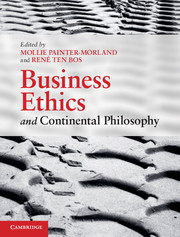Book contents
- Frontmatter
- Contents
- Figures
- Boxes
- Contributors
- Foreword
- Acknowledgements
- Introduction: critical crossings
- 1 Agency in corporations
- 2 Stakeholder theory
- 3 Organizational culture
- 4 Enron narrative
- 5 Moral decision-making
- 6 Organizational justice
- 7 Reward, incentive, and compensation
- 8 Leadership
- 9 Whistle-blowing
- 10 Marketing, bad faith, and responsibility
- 11 Corporate social responsibility
- 12 Corporate responsibility standards
- 13 Sustainability
- 14 Globalization
- Glossary
- Name index
- Subject index
- References
4 - Enron narrative
Published online by Cambridge University Press: 05 June 2012
- Frontmatter
- Contents
- Figures
- Boxes
- Contributors
- Foreword
- Acknowledgements
- Introduction: critical crossings
- 1 Agency in corporations
- 2 Stakeholder theory
- 3 Organizational culture
- 4 Enron narrative
- 5 Moral decision-making
- 6 Organizational justice
- 7 Reward, incentive, and compensation
- 8 Leadership
- 9 Whistle-blowing
- 10 Marketing, bad faith, and responsibility
- 11 Corporate social responsibility
- 12 Corporate responsibility standards
- 13 Sustainability
- 14 Globalization
- Glossary
- Name index
- Subject index
- References
Summary
We're taking on the entrenched monopolies. In every business we've been in, we're the good guys…We're bringing the benefits of choice and free markets to the world.
I don't think Enron is that unusual. After all, we have a chief executive class which act like dictators of small Latin American countries.
Introduction
No business scandal has precipitated greater interest in the ethics of business than the spectacular rise and precipitous fall of Enron. Enron was widely acclaimed as a highly reputable, model company. It enjoyed the confidence of the banks and credit rating agencies as well as top-flight law and accounting firms. Celebrated by consultants and business school academics, Enron was praised for blazing a trail that other, less innovative and progressive firms were urged to follow. Companies aspiring to receive equivalent plaudits were entreated to emulate and outshine Enron, including its reputation for philanthropy. Following its collapse in 2001, many Enron executives were convicted of tax and securities fraud, insider dealing, money laundering, and other offences. Nonetheless, Enron continues to have its admirers and defenders.
- Type
- Chapter
- Information
- Business Ethics and Continental Philosophy , pp. 96 - 116Publisher: Cambridge University PressPrint publication year: 2011
References
- 4
- Cited by

